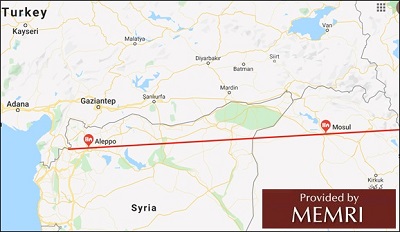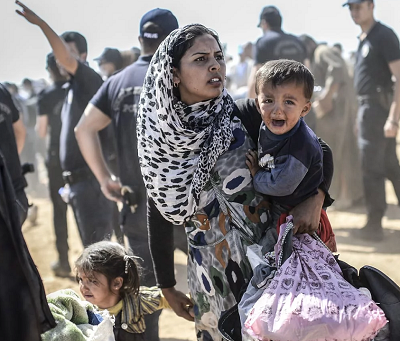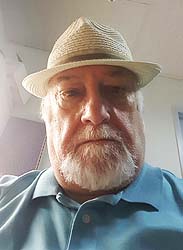 Zapowiedź wielkiej wojny?
Zapowiedź wielkiej wojny?
Andrzej Koraszewski
Zajęcie Krymu przez Rosję było zaledwie testem, sprawdzaniem jak daleko można się posunąć, stopniowa inwazja Islamskiej Republiki Iranu na kraje sąsiednie, to systematyczne sprawdzanie siły, a może raczej słabości Zachodu, Turcja stopniowo przechodzi od islamizacji kraju, cichego sojusznika ISIS, do otwartej wrogości wobec Ameryki i nieskrywanej zapowiedzi odbudowy osmańskiego imperium. Artykuł w tureckiej gazecie zapowiada nie tylko rozszerzenie inwazji na Syrię, ale również aneksję irackiego Kurdystanu. Autor artykułu, İbrahim Karagül, to redaktor naczelny prorządowej gazety „Yeni Şafak”, ale również człowiek uważany za głos prezydenta Erdogana. Dziennikarz może powiedzieć więcej, może również mówić wyraźniej.
Turcja jest członkiem NATO od 1952 roku. Kiedyś stanowiła przeciwwagę Związku Radzieckiego na Morzu Czarnym, ważny bastion chroniący przed radziecką inwazją na Bliski Wschód. Dziś Turcja rządzona przez partię polityczną związaną z Bractwem Muzułmańskim, coraz częściej postrzegana jest w NATO jako piąta kolumna i potencjalny wróg. Stany Zjednoczone stopniowo wycofują z Turcji swoją broń atomową, odmówiły temu krajowi sprzedaży najnowocześniejszych samolotów bojowych, pojawiają się coraz częściej pytania jak ograniczyć Turcji dostęp do natowskich tajemnic. Erdogan szuka porozumienia z Moskwą, zdecydował się na zakup rosyjskiego systemu obrony przeciwlotniczej S-400 i nie ukrywa, że bliżej mu do obozu przeciwników Zachodu niż do Zachodu.
Na ile artykuł İbrahima Karagüla prezentuje stanowisko i plany tureckiego prezydenta? Z pewnością w dużym stopniu, wiele rzeczy Erdogan powiedział już osobiście, Karagül idzie tylko o krok dalej. Na ten głos z pewnością warto zwrócić uwagę. İbrahim Karagül pisze o koalicji przeciwko ISIS pod przywództwem Amerykanów:
Nasze miasta są atakowane i masakry cywilów są dokonywane przez używanie materiałów wybuchowych dostarczonych przez nich.
Broń, która mogłaby wyposażyć i uzbroić dziesiątki i tysiące, nie może być uważana tylko za wsparcie dla organizacji terrorystycznej [chodzi o siły, głównie kurdyjskie, które walczyły z ISIS].
Były robione przygotowania do wielkiej wojny przeciwko Turcji. To był wielki plan, który maskowali organizacją terrorystyczną. Tym planem był podział Turcji. Było zatrzymanie i ukaranie Turcji, która mimo wszystkiego podnosiła się.
Czy myślicie, że tylko PKK uderza nas? To była broń USA, broń niemiecko/francuska, broń izraelska, które dotąd uderzały ten kraj, ten naród.
Plan drugiego Izraela upadł [chodzi o Kurdystan, który Turcy uważają za „drugi Izrael”]. Oni myśleli, że Turcja skuli się ze strachu!
Budowali ”drugi Izrael”. W momencie, w którym byliby gotowi na syryjskim terytorium, mieli otworzyć front turecki i rozpocząć turecki etap korytarza.
Brzmi znajomo? Nie bez powodu. Po raz kolejny narasta przekonanie, że sytuacja dojrzała do rzucenia rękawicy i nowego kreślenia map. Turecki dziennikarz pisze nie tylko o tym, jaką straszliwą ofiarą Zachodu jest dziś Turcja i jak to Kurdowie są używani do wojny z pokojową Turcją. Autor pisze również czego Turcja (na początek) żąda:
To nie jest wojna, to jest obrona ojczyzny, to jest prawomocna samoobrona. Niezależnie od tego, kto stoi przeciwko nam, to jest cel, który musimy osiągnąć.
Aleppo-Mosul jest czerwoną linią. Spójrzcie na ostatnie tysiąclecie w historii regionu! Zrozumiecie wszystko!
Żadna siła na północ od linii Aleppo-Mosul nie powinna zagrażać Turcji. Ta linia jest naszą południową linią bezpieczeństwa. Ten region nie może być pod panowaniem żadnej organizacji terrorystycznej, ani nieregionalnego kraju.
Warto spojrzeć na mapę, żeby zrozumieć o czym mówi:

Na tej mapie widzimy tereny zamieszkałe głównie przez Kurdów, jednak turecki dziennikarz nie ukrywa, że prawdziwymi wrogami Turcji nie są jacyś tam Kurdowie, jego zdaniem oni są zaledwie narzędziem potężniejszych wrogów:
Chowając się za PKK i Daesh, prowadzili „ciemną wojnę” w najohydniejszy sposób.
Pracowali nad projektem mapy i budowali front długi na setki kilometrów tuż przed nosem Turcji, z aż 30 tysiącami ciężarówek broni i amunicji, 6 tysiącami załadowanych samolotów transportowych, setkami milionów dolarów płynących z Arabii Saudyjskiej i Zjednoczonych Emiratów Arabskich, cementem z francuskiej firmy La Farge i wszystkimi taktykami i siłami armii Izraela.
Ta broń jest używana przeciwko nam, nasi żołnierze zostają męczennikami przez tę broń
Cała ta broń jest używana przeciwko naszemu krajowi, przeciwko naszym żołnierzom.
Nasi żołnierze, którzy zostają męczennikami w Syrii, giną przez tę broń.
Jesteśmy zamęczani bronią USA, bronią z Izraela i Europy.
Centralnym hasłem rewolucji w Islamskiej Republice Iranu jest okrzyk: „Śmierć Ameryce, śmierć Izraelowi”. Tu retoryka jest nieco odmienna. Tu dziennikarz krzyczy, że Turcja jest atakowana, Turcja tylko się broni przed starannie przygotowywaną agresją. Karagül pisze:
Myśleli: ”Turcja nie może walczyć z USA, Izraelem i UE naraz”. Mówili: ”Turcja jest w systemie atlantyckim; jeśli powiemy nie, nie może się ruszyć”.
Myśleli: „Saudyjczycy i siły Zjednoczonych Emiratów Arabskich i tak sprowokują cały region przeciwko Turcji”.
Wydaje się, że zapomnieli, że posiadamy dziedzictwo Osmanów i Seldżuków! Myślą, że Turcja jest ograniczona tylko do nowoczesnej ery i do Anatolii.
Dowiadujemy się, że Ameryka jest zaprzedana Izraelowi, że kraje arabskie sprzedały Jerozolimę, że pod nosem Turcji chciano stworzyć nowy Izrael. „Uderzyliśmy w organizację terrorystyczną – pisze z dumą turecki dziennikarz – ale uderzyliśmy w całą koalicję”.
Turcja zniweczyła największy plan XXI wieku.
Następne w kolejce: Manbidż, Ajn Al-Arab.
Rasulajn i Tal Abjad zostały oczyszczone w pięć dni Operacją Wiosna Pokoju Turcji. Południowa linia strefy bezpieczeństwa została osiągnięta. Tym, co nastąpi, jest oczyszczenie całego regionu, od Manbidż, od Ajn al-Arab do Hasakah.
Faktycznie „strefa bezpieczeństwa” została oczyszczona, setki zabitych, tysiące rannych i dziesiątki tysięcy uchodźców. Jak wielu? Największa liczba, z którą się spotkałem to 200 tysięcy, zapewne niebawem otrzymamy nieco bardziej precyzyjne dane.

Barbarzyństwo trzeba nazwać samoobroną. Ludobójstwo „Operacją Wiosna Pokoju”. Świat zachodni raz jeszcze uratował pokój. Za jaką cenę i na jak długo? Jak daleko sięgają plany prezydenta Turcji? Czy można je traktować rozłącznie z planami Islamskiej Republiki Iranu i planami prezydenta Rosji?
* Artykuł İbrahima Karagüla czytałem w tłumaczeniu na język angielski na stronie MEMRI.org: https://www.memri.org/reports/editor-turkish-pro-government-daily-turkish-invasion-northeast-syria-turkey-not-limited
Zawartość publikowanych artykułów i materiałów nie reprezentuje poglądów ani opinii Reunion’68,
ani też webmastera Blogu Reunion’68, chyba ze jest to wyraźnie zaznaczone.
Twoje uwagi, linki, własne artykuły lub wiadomości prześlij na adres:
webmaster@reunion68.com









